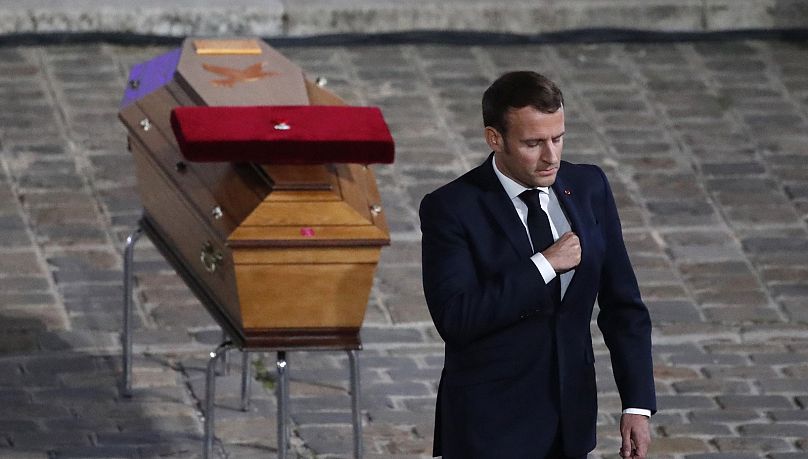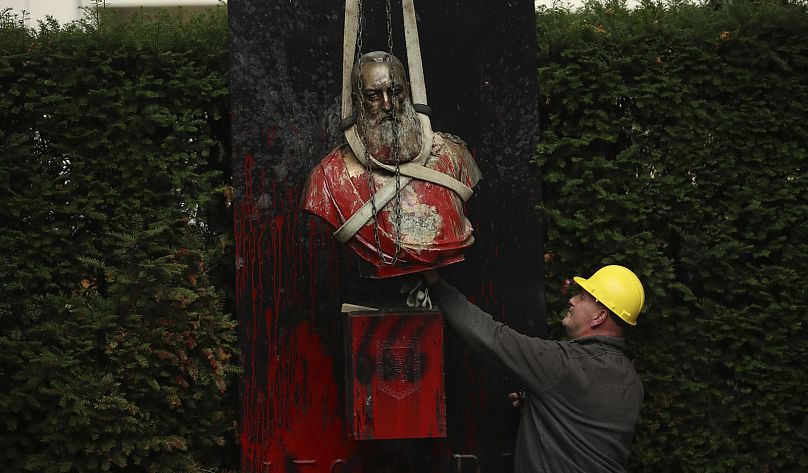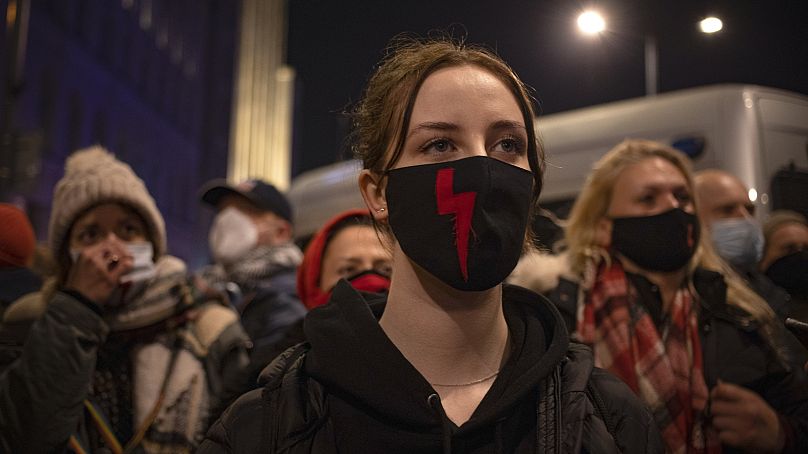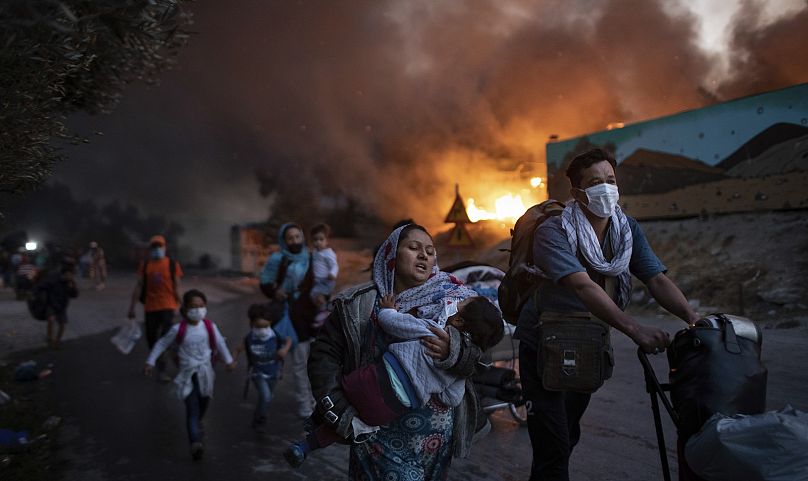The coronavirus pandemic is not the only event to touch the lives of Europeans. Here are just some of the stories to make the headlines during the year of COVID-19.
The year 2020 will forever be synonymous with coronavirus. It's the year the countries of the world barricaded their borders and curbed the freedoms of their citizens in order to stop the spread of a once in a century pandemic. The fight to contain the spread of the COVID-19 disease has dominated the year's news agenda.
Given the level of coverage devoted to it, you would be mistaken in believing it is the only thing that has happened this year. Here are just some of the biggest news stories from around Europe in 2020 that weren't COVID-19-related.
France
France has been no stranger to terrorism in the last decade, with more than 30 terror attacks taking place on French soil. This year - which was marked by two major trials of the perpetrators of the Charlie Hebdo attack and the attempted terror attack on a Thalys train, both in 2015 - was no exception. In 2020 alone, France saw seven terror attacks. Perhaps the most horrific and the one to strike at the heart of the country was the beheading of school teacher Samuel Paty on October 16. The 47-year-old was attacked not far from the school where he taught in the Parisian suburbs. Paty's brutal death sent shockwaves throughout the country, not least because he was targeted by an Islamic extremist after teaching his students a lesson on freedom of speech and expression using a cartoon of the Prophet Muhammad by Charlie Hebdo magazine.
Germany
Infrastructure projects in Germany are not usually noteworthy for delays. So, when the construction of a new flagship airport to serve the capital Berlin was beset by a series of problems and postponements, the world took notice. Plagued by poor decision making, planning, and design flaws, the airport's construction dragged on past its initial completion deadline of 2011. Problems with the fire protection system for the entire site in 2012 forced another postponement. Branded a white elephant, Berlin Brandenburg Airport finally opened this year nearly a decade late and more than three times over budget, becoming fully operational on October 31. With aviation crippled and international travel having all but collapsed due to the pandemic, just 213,000 passengers passed through the airport in its first month.
Belarus
The disputed presidential elections of August 9 have been a catalyst for months of protest and calls for change. President Alexander Lukashenko - dubbed "Europe's last dictator" - won more than 80 per cent of the vote after more than 26 years in power, leading many opposition figures to pronounce that the election had been rigged. Protests with hundreds of thousands of attendees in the capital Minsk and other Belarusian cities became the norm in the weeks and months following the vote. Women in particular have been instrumental in keeping momentum going in calling for fair elections and social reforms in the former Soviet country. Many of the opposition movement's leaders are either now in jail or exile, like Lukashenko's challenger Sviatlana Tsikhanouskaya. Months of protests - often met with brutal force and mass arrests by state police - have now given way to individual acts of civil disobedience, including street parties and concerts and anti-government street art.
United Kingdom
Besides the coronavirus pandemic, one other major news story has dominated the headlines this year: Brexit. The UK officially departed the European Union on January 31, entering an 11-month long transition period in which negotiations over a future trade deal were to be hashed out. Simmering away in the midst of the pandemic, the often fraught negotiations - which stalled on several key issues, including fishing rights - reached a climax with a last-minute deal agreed on Christmas Eve, just over a week before the transition period officially ended. The deal was franticly scrutinised and passed by lawmakers in the UK in the last hours before the end of the transition period on New Year's Eve.
Bulgaria
As in many European countries this year, coronavirus restrictions did not perturb people gathering en masse to protest about issues or events taking hold in their country. Since the summer, Bulgaria has witnessed consecutive days of protests in the capital Sofia and cities across the country demanding the resignation of prime minister Boyko Borissov and his government over allegations of corruption. Borissov, who counts German Chancellor Angela Merkel among his EU allies, has been accused of letting corruption fester at the heart of Bulgaria's democracy over links to oligarchs close to his GERB party and eroding the rule of law in the country. Polls in October showed two-thirds of Bulgarians favoured a change in government sooner than the next general election due in March 2021.
Russia
Alexei Navalny, a prominent opposition figure and critic of President Vladimir Putin, is no stranger to threats, intimidation, and attempts on his life. His bids to run for high office, including against Putin in 2018, have been met with politically-motivated coercion and interference. It is no surprise that his work exposing corruption on his YouTube channel has attracted the attention of the Russian establishment. When Navalny fell into a coma on a flight from Siberia to Moscow in August after a suspect poisoning, there was little doubt for many who could be behind it. The politician was airlifted to Berlin for further treatment where tests carried out by independent labs in Germany and Sweden confirmed he had been poisoned with the Soviet-era nerve agent Novichok. For Navalny, there was no question the attempt on his life had been state-sanctioned. An investigation by Bellingcat in December further implicated Russian's Federal Security Service in the poisoning. While recuperating in Germany, Navalny was presented with new fraud charges by Russian authorities on December 30.
Belgium
In the wake of the death of George Floyd in police custody in Minneapolis in the US on May 25, the Black Lives Matter movement swept the globe. The call for racial justice was keenly felt in Belgium, with the country being forced to take stock of its colonial legacy and the imperialist atrocities committed in what was the Belgian Congo. The figure of King Leopold II, the monarch most associated with the expansion of Belgium's empire in the 19th century and the deaths of millions, become a lightning rod for activists demanding change. In incidents mirrored in cities across Europe, statues of the former king were daubed with red paint and graffiti, with the word "assassin" scrawled on one in Brussels. One in Antwerp was removed completely.
Malta
Malta marked the third anniversary in October since the assassination of investigative journalist Daphne Caruana Galizia in a car bomb attack in 2017. The small island state was rocked to its very foundations by her murder, with justice remaining elusive three years on. Caruana Galizia's reporting exposed alleged corruption which went to the very top of the government led by now ex-prime minister Joseph Muscat. Facing criticism over his government's links to and handling of her death, Muscat resigned and left office in January saying claiming he'd paid "the highest political price for a dark episode". Muscat would later face questioning in December at the public inquiry he had set up into Caruana Galizia's murder.
Spain
In June, the left-wing government in Spain launched a new initiative: a Minimum Living Income scheme. Initially agreed in a coalition deal between the Socialist (PSOE) and Podemos parties, the pandemic necessitated it being soft-launched in a limited way to help families struggling most financially. There have been trials of Universal Basic Incomes (UBI) in various countries, including one in Finland which gained international attention. However, no country in the world currently has a UBI system in place, meaning Spain could be the first country in the world to legislate one into being. Initially benefiting 255,000 people, who receive a minimum €700 monthly payment, up to 850,000 households and 2.3 million people across the country will benefit from the scheme once it is fully rolled out.
Austria
France has not been the only European country touched by terrorism this year. In November, panic swept the streets of Vienna when a lone gunman, armed with an automatic rifle and a machete, killed four people in the centre of the Austrian capital. Many people were out socialising, enjoying the last night before a partial lockdown due to the coronavirus pandemic began. The country's domestic intelligence service admitted failing to follow up on tips from Slovakian authorities about Kujtim Fejzula, an Austrian-North Macedonian dual national who a year earlier had been arrested and jailed trying to travel to Syria to join Islamic State. Fejzula had tried and failed to buy ammunition in Slovakia during the summer. He was shot dead by police following the attack.
Poland
2020 has been a turbulent year in Polish politics, one which revealed the deep schisms in the country's society. First came the hard-fought presidential run-off election in June between conservative, Catholic Church-backed incumbent Andrzej Duda, who campaigned with ferociously anti-LGBT rhetoric, and his more liberal challenger, Warsaw mayor Rafał Trzaskowski. Duda won re-election on a night-edge margin. Then, on October 22, Poland's top court, which has been packed with government-appointed judges, ruled that it was unconstitutional to abort a foetus if it had congenital defects, all but restricting abortion in all circumstances. Poland, thus, became the only EU country to remove a right to legal abortion from its citizens. In response, thousands took to the streets in weeks of protests against the Law and Justice (PiS) government and its leaders and in support of abortion rights for women.
Italy
The discovery of pink snow on a glacier in northern Italy brought the climate crisis back onto the agenda. The snow, which had traces of algae usually only found in Greenland, is not a good sign for the future health of the Presena glacier, also known as "the giant of the Alps". A conservation effort launched in 2008, using large pieces of geotextile fabric to protect it from the sun's heat in summer, has helped but the discovery of the pink algae is troubling. Ice usually reflects over 80 per cent of the sun's radiation, but as the ice changes colour, it is less able to refract heat and so begins to melt faster. The more rapidly the ice melts, the more algae is uncovered. A study in 2019 showed that two-thirds of Europe's glaciers would be gone by 2100.
Denmark
"A new gateway to Europe": that's how the latest ambitious infrastructure project in Scandinavia was billed earlier this year when the Fehmarnbelt underwater tunnel was greenlit by Danish lawmakers in April. Cutting travel times between Denmark and Germany to just minutes, work is due to start on the Danish side of the tunnel in January 2021 having been postponed by six months because of the pandemic. Linking northern Germany to the Danish island of Lolland, which are separated by the Fehmarn Belt, a strait in the western part of the Baltic Sea, the 18-kilometre motorway and rail tunnel will reduce the current travel time of an hour by ferry crossing to just 10 minutes by road and 8 minutes by rail. The Fehmarnbelt Link as it is being called will be the longest tunnel of its kind in the world on completion.
Hungary
While personal freedoms have been restricted in a bid to contain coronavirus, so have the rights of minority communities, particularly in Hungary. The right-wing Fidesz government, led by prime minister Viktor Orban, has made the country a bete noire in EU circles for its erosion of press freedom and the rule of law, so much so that Hungary has faced sanction by the bloc for its policies. In 2020, the LGBTQ+ community became the latest targets of the government with a series of reforms and constitutional amendments that all but banned gay marriage and adoption by same sex couples. It was with some surprise then when the news that Fidesz MEP József Szájer had been caught breaking pandemic restrictions at a gay orgy in Brussels broke in December. Officially, Szájer resigned for breaking pandemic restrictions and the proposed reforms were passed regardless.
Greece
Much like climate change, Europe's migrant crisis hasn't gone away despite being eclipsed by the ongoing pandemic. In Greece, one of the major faultlines of the crisis, the worsening conditions for migrants stranded in camps became exacerbated by coronavirus. The Moria camp on the island of Lesbos was originally built to house 2,750 people but its population swelled to 12,500 by 2020. A fire, started by residents who were angered about quarantine orders being imposed on the camp after 35 people tested positive for COVID-19, devastated the camp leaving thousands of displaced men, women, and children homeless. Many took refuge in hastily erected shelters made of reed stalks, blankets, and salvaged tents but without adequate food, water and housing, the humanitarian situation worsened sparking violent protests.
Ireland
A general election in Ireland in February, before COVID-19 prompted the lockdown of many countries around the world, yielded an inconclusive result and foreshadowed a difficult road ahead in the formation of a stable government. The election was an unprecedented three-way race with the net beneficiary of voter dissatisfaction being Sinn Féin. The murky past of the former political arm of the Real IRA did not deter voters, with the republican party becoming the second-largest party in the Dáil and the winner of the popular vote. Coalition negotiations, hampered somewhat by the pandemic, concluded in June, giving Ireland its first grand coalition between historic rival parties Fianna Fáil and Fine Gael and the Greens.
Slovakia
The murders of investigative journalist Ján Kuciak and his partner Martina Kušnírová in their home outside Bratislava shook Slovakia, sparking the biggest protests the country had seen since the fall of communism in 1989 and forcing the resignation of the government. Kuciak had been investigated the dealings of prominent businessman Marián Kočner at the time of his death and was accused of threatening him before Kuciak was gunned down. In September, a panel of judges acquitted Kočner and two of his associates of the murders citing a lack of evidence. The verdict was met with disbelief. The families of Kuciak and Kušnírová have vowed to fight on for justice and appeal the court's decision. Despite changes in the wake of Kuciak's assassination, Reporters Sans Frontières says press freedom in Slovakia is still under threat.
Cyprus
Simmering tensions in the Eastern Mediterranean came to the boil in 2020 as Turkey flexed its muscles in the region and in doing so enraged both Cyprus and Greece. The seas around Cyprus in particular are a pressure point in a spat over exploration for natural resources and drilling rights. Turkey sent various drilling vessels escorted by naval ships into areas recognised as being Greek and Cypriot territorial waters, turning what has been a war of words into a show of military strength. For Cyprus, Turkish infringements did not end there. Presidential elections in the north of the partitioned island resulted in a win for the pro-Turkey candidate. Turkey duly reopened the occupied-Cypriot ghost town of Varosha, a move which the EU's chief diplomat Josep Burrell said would lead to further tensions and stymie efforts to reunify the island.
Switzerland
Brexit wasn't the only instance of resistance to EU influence. In Switzerland, a referendum, endorsed by the populist far-right Swiss People's Party, was put to the people on September 27 in which the electorate was asked to approve limits on immigration after a 2014 referendum to bring quotas back was scaled down by the Swiss parliament. In effect, the limits would restrict the freedom of movement for EU citizens to live and work in Switzerland, damaging the country's relationship with the bloc. In the event, the Swiss voted 61.71 per cent against it the initiative.
Every weekday at 1900 CET, Uncovering Europe brings you a European story that goes beyond the headlines. Download the Euronews app to get an alert for this and other breaking news. It's available on Apple and Android devices.















